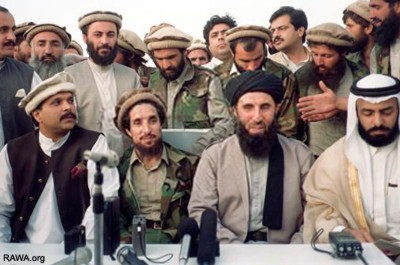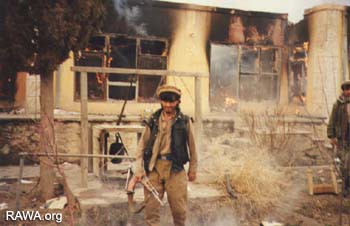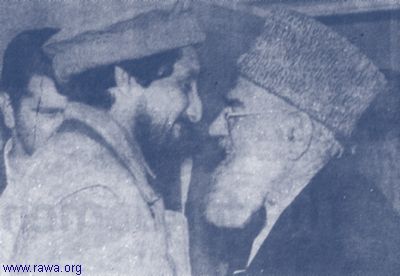Warrior and peace
Is Ahmad Shah Masood a legitimate candidate for the Nobel Peace Prize?
The News on Sunday, May 12, 2002
By Mohammad Shehzad
Afghanistan's slain military supremo Ahmad Shah Masood has been nominated for the Nobel Peace Prize. A group of French parliamentarians has submitted the nomination to the Norway-based Nobel Peace Prize committee. Masood is recognised as a warlord in this part of the world who could never be compared with a peace activist. He was labeled as a 'butcher' by the Pashtuns. His nomination has deeply disappointed the true preachers of peace and human rights.
The instant reaction of Revolutionary Association of Women of Afghanistan (RAWA) to this weird news was: "A number of precedents have proved that the Nobel Peace Prize is not awarded on merit. It is conferred upon the lackeys of the West. According to Sartre, it is awarded to Western writers and Eastern criminals! Masood had a deceptive personality. He belonged to the Jamiat-i-Islami that was an ultra-fundamentalist outfit. During his regime, thousands of women were raped in Afghanistan. How could a civilised nation like France do this injustice? We strongly condemn his nomination and urge the human rights activists to protest it."
Massoud (2nd from left) signing agreement with Gulbuddin Hekmatyar, the most wanted criminal in Afghanistan, in presence of their Pakistani and Arab masters.
Is Masood a legitimate candidate for the Nobel Peace Prize or not, to seek an answer, TNS spoke to a few learned experts on Afghanistan.
AHMAD SALIM:
According to the Time (June 11, 1984), one of Masoud's biggest operations against Russians was organized, financed and directed by CIA. * * *
Milton Bearden, the CIA's station chief in Pakistan during the war: "Masoud spent most of his time preparing for the coming civil war -not fighting the Communists."
Los Angeles Times, April 26, 1999
In the scholastic opinion of the renowned historian Ahmad Salim, decorating murderers with awards such as Nobel Peace Prize was no more a bizarre phenomenon. He said: "The Swedish Academy, who had not fully blown out its reputation, has now proved that it is a great proponent of the agents of state terrorists and those elements who foment suppression. The French Revolution is the glorious victory and legacy of every peace activist, revolutionary and humanist in the world. By nominating Masood for the peace prize, the French Parliamentarians have not only insulted them but also blasphemed the souls of Voltaire and the martyrs of the French Revolution. The history testifies that Voltaire also raised his voice in the support of the 'slave' Indians rather than siding with the East Indian Companies of Britain and France!"
IMTIAZ GUL:
Imtiaz Gul, a senior journalist, was of the view that Masood was not a qualified candidate. "He has been a combatant -- even before he was blown up, his forces had laid land mines from Taloqan to Badakhshan that killed hundreds of Taliban. A candidate of peace prize should not be a partisan. Masood was part of the Afghanistan conflict. He was suspected by a lot of Afghan leaders. He had secret prisons in Panjshir and Khawaja Bahauddin where he tortured Pakistani prisoners. Masood was the blue-eyed boy of the French. They perceived him as the most liberal Afghan leader, which he was not! He never allowed his wife to show her face to his younger brother. His chances of winning the prize are minute. If he won, that will raise many questions!"
An Afghan woman recounts how her husband was killed in Afshar, west of Kabul. Hundreds of innocent people from Hazara minority were massacred by forces of Sayyaf and Ahmad Shah Massoud in this area in 1993
According to The Guardian, November 16, 2001:
On February 11, 1993, Massoud and Sayyaf's forces entered the Hazara suburb of Afshar, killing - by local accounts - "up to 1,000 civilians", beheading old men, women, children and even their dogs, stuffing their bodies down the wells.
For details of Afshar massacre read Human Rights Watch document “Blood-Stained Hands: Past Atrocities in Kabul and Afghanistan’s Legacy of Impunity” (July 7, 2005) which also confirms Massoud’s involvement in the crime:
"... another commanders’ meeting was held by Massoud in a safe house in Karte Parwan, near the Hotel Intercontinental, on the night before the offensive… Massoud also convened a meeting in the Hotel Intercontinental on the second day of the operation, February 12, attended by military commanders and political figures, including Rabbani, Sayyaf and Fahim.
Ahmad Shah Massoud is implicated in many of the abuses documented in this report, both those committed by Jamiat forces, and those committed by other militia forces under his command...."
AYAZ AMIR:
Ayaz Amir is a seasoned columnist. When he was requested to comment on this issue in the light of international law, he said: "It is not a question of international law. It requires some signal contribution for peace -- like some outstanding achievement for peace, a major peace agreement or something of that sort. What has he done? He was a warlord in the beginning and later became the opponent of the Taliban. He was the defence minister of the Rabbani Government. That was the time when Kabul was reduced to rubble and amongst the competing ambitions which reduced Afghanistan to a land of sorrow, one of those ambitions was that of Masood. He was no better or worse than the other warlords."
About the esteem of the Nobel Prize, Mr Amir remarked: "There is always a political angle to such awards. The Nobel Prize has already fallen into a pit of disrepute. This is because some of its recipients have been bad choices -- Henry Kissinger, Shimon Perez and even Kofi Anan! What has the UN done for peace? The other Nobel Prizes are held in high regard but the 'Peace Prize' sometimes comes in for a lot of cynicism."
HAMID GUL:
General Hamid Gul is the author of the abandoned Pakistan Afghan policy. He said: "He was a good fighter. He was not a political figure -- a figure of great consequences. He could not unite Afghanistan. Like Hikmatyar, he too was responsible for ruining Afghanistan. He was one of the perpetrators who aggravated the ethnicity conflict in Afghanistan and was harsh with prisoners. The French always patronised him. They were directly dealing with him. The French always had an interest in the division of Afghanistan along ethnic lines."
When asked what will happen if Masood won the prize, the General stated: "Pakistan will be a great sufferer. The Pashtoon prejudice will sharpen in Afghanistan while the Tajik prejudice will be hardened."
TAHIR KHAN:
A Criminal fighter of Shura-e-Nezar (Supervisory Council) led by Ahmad Shah Masoud. Kabul 1993 According to Los Angeles Times (Apr.26,1999): "In one terrible incident in 1993, documented by the State Department, Masoud's troops rampaged through a rival neighborhood, raping, looting and killing as many as a thousand people."
Tahir Khan strings for the Iranian news agency IRNA. He hailed the decision admiring Masood as a great mujahid. "He deserves it on account of defending his homeland against the Soviet occupation and making peace offers to Mullah Omar on numerous occasions. He was willing to work with the Taliban to resolve the Afghanistan crisis but his initiatives were never reciprocated. It is a healthy sign that a Muslim mujahid has been nominated for such a prestigious award."
RAHIMULLAH YUSUFZAI:
Rahimullah Yusufzai, The News expert on Afghanistan shared some enlightening thoughts. Excerpts. "Ahmed Shah Masood should have been nominated for a gallantry award. He has been fighting throughout his life. He never worked for peace. Kabul was destroyed in 1994 because of him -- 50,000 people were killed and the number of those who became homeless was greater than this. Most of them took refuge in Pakistan. It was his lust for power -- like that of Hikmatyar, Abdul Ali Mazari, Rashid Dostum, and Professor Sayyaf -- that reduced Kabul into rubble.
"Masood spoke French fluently. The French had a long love affair with him. He was glorified disproportionately by the French media. Those who glorified him did not care that he was not acceptable to the majority of Afghans. He became controversial right form the early phase of the Afghan jihad when he agreed to a ceasefire with the Soviet army. The ceasefire gave passage to the red army to Salang Highway and enabled Moscow to supply its troops in Kabul and in the east and south of Afghanistan. That was really unthinkable and an act of treason! No mujahid could have thought of a ceasefire like this. Like a number of other Afghan leaders, Masood also accepted military and monetary support from outsiders which allowed them to interfere in Afghanistan's affairs."
"In March 1995, Massoud [Defence Minister at that time] forces were responsible for rape and looting after they seized control of Kabul's predominantly Hazara neighborhood of Karte Seh. On the night of Feb. 11, 1993, the Massoud and Sayyaf forces conducted a raid in west Kabul, killing Hazara civilians and committing widespread rape. Estimates of fatalities range from 70 to more than 100.
Human Rights Watch, October 10, 2001
When Mr Yousafzai was reminded that in the light of the disputed ceasefire, Masood did not deserve even a gallantry award, his reply was: "I credit him for staying in Afghanistan unlike many others who fled to Iran or Pakistan. He fought till the end and never surrendered. He should be commended for forming an organised guerilla force. He was a very good commander and strategist who understood the training needs of his soldiers. He was also very popular among Tajiks."
In March 1995 Shura-e-Nezar forces reportedly carried out raids on hundreds of civilian homes in Kabul's south-western district of Karte She, killing or beating whole families, looting property and raping Hazara women. One family, interviewed by a foreign journalist in Kabul, said President Rabbani's soldiers had told them they wanted to "drink the blood of the Hazaras". Medical workers in the area confirmed at the time at least six incidents of rape and two attempted rapes, but believed the actual number was much higher. "International responsibility for human rights disaster", (AI, 1995)
We hope the French Ambassador in Islamabad will convey the above views to his people and a greater sanity will prevail among the French.
Ahmad Shah Massoud with Qazi Hussain Ahmad leader of Jamaat Islami Pakistan, top fundamentalist figures of Pakistan and the father of all Afghan jehadi groups.
How the CIA supports and supplies the anti-Soviet guerrillas (Time Magazine, Jun. 11, 1984) The "Afghan" Who Wouldn't Fight Massoud links with CIA Ex-Soviet commander unveil Masoud's secret pact AI condemns execution of 6 people by forces of Ahmad Shah Massoud Ahmad Shah Masoud: The Janos Savambi of Afghanistan Masoud and the killing of 85 educated men of Panjsheer 5,000 were killed in 25 days of continued fighting in Kabul in Feb 1993 Felix Ermacora: 10,000 killed in 8 months in Kabul Masoud joins hands with India Russia gives 3 coptors to Ahmad Shah Masoud Ahmad Shah Masoud provides shelter to most wanted terrorists Masoud gunmen in action after entering Kabul in 1992 Public execution by Rabbani-Masoud government in 1992 Gunmen of Masoud burn books in Kabul University in 1993
French Version



